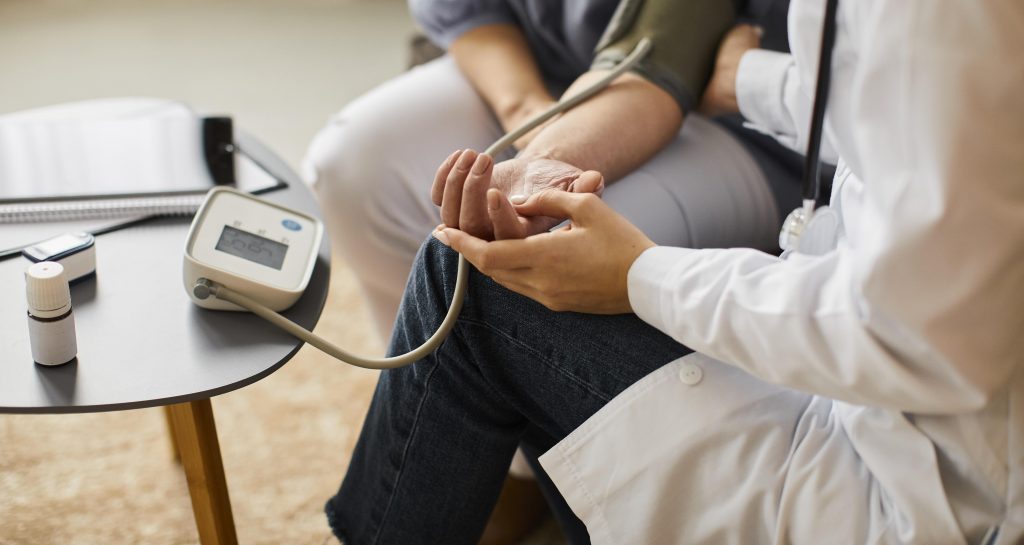Hypertension – high blood pressure (pressure) – HOLTER blood pressure monitoring

Hypertension is elevated blood pressure, which is defined as a value of systolic “upper” pressure permanently higher than 140 mmHg, or diastolic “lower” blood pressure permanently higher than 90 mmHg. The prevalence of hypertension is around 25-30% in the adult population.
High blood pressure is very often a disease that occurs with very few symptoms, or they are even absent. That is why this disease is often called the “silent killer”. Patients with elevated blood pressure can have very diverse symptoms, depending on whether another organ system has been attacked and damaged by long-term hypertension. The organs that are most affected and die in hypertension are: heart, brain, eyes, kidneys and blood vessels. Symptoms most often experienced by patients with high blood pressure are: headaches (especially in the back of the head), fainting, ringing in the ears, unsteadiness when walking, pain or similar sensations in the chest, shortness of breath, a feeling of rapid or irregular heartbeat, and so on.
It should not be forgotten that hypertension is a very important cardiovascular risk factor and that patients with hypertension develop coronary heart disease (heart attack) ten years earlier than their peers who do not have it. People who have hypertension are up to five times more likely to have a stroke than those with normal blood pressure.
Too much pressure on artery walls caused by high blood pressure can damage blood vessels and organs in your body.
The higher the blood pressure and the longer it goes untreated, the greater the damage will be. If high blood pressure is not treated, it can lead to:
Heart attack or stroke – High blood pressure can cause hardening and thickening of the arteries (atherosclerosis) which can lead to heart attack, stroke or other complications.
Aneurysms – Hypertension can weaken the blood vessels and lead to enlargement and the appearance of aneurysms. If an aneurysm ruptures, it can be life-threatening.
Heart failure – To be able to pump blood with increased pressure in the blood vessels, the heart muscle can thicken. A thickened muscle struggles to pump blood to supply the body with enough blood, and this can ultimately lead to heart failure.
Weakened and narrowed blood vessels in the kidneys – This can interfere with the normal functioning of the kidneys.
Thickened, narrowed or ruptured blood vessels in the eyes – This can lead to vision loss.
Metabolic syndrome – This syndrome is a group of metabolic disorders that include: increased waist circumference, elevated triglycerides, low levels of high-density lipoprotein (HDL) or good cholesterol, elevated blood pressure and high insulin levels. If you have high blood pressure, you are more likely to have other components of metabolic syndrome. The more components you have, the higher your risk of developing diabetes, heart disease and stroke.
Difficulty with memory and understanding – Uncontrolled high blood pressure also affects your ability to think, remember and learn. Difficulty remembering or understanding occurs more often in people with high blood pressure.
The basis of a good treatment of hypertension is a change in lifestyle habits in terms of quitting smoking, reducing body weight, intensifying physical activity, and eating healthy.
In our Center, hypertension is treated in accordance with the most modern World and European guidelines for the treatment of this disease with the rich experience of our cardiologists.
Blood pressure fluctuates very often during the day, and it is important to register these changes. In this way, we can record in which part of the day you had “jumps” in blood pressure, but also how we can optimize your therapy for hypertension. The device for 24-hour blood pressure measurement enables measurement almost identical to “classic” blood pressure measurement. Usually, 15-30 min during the day and 60 min during the evening, the device automatically measures your blood pressure via a small digital meter and registers these values.
In order to enable accurate measurement, it is important to ensure that the hose of the device is not bent. Immediately before the measurement, the device will beep. When this happens, if you can, you should sit down, allow the cuff to be at the level of your heart and keep your arm extended at the elbow.
WORKING HOURS
CONTACT
- +387 35 309 100
- info@mib.institute
FOR PATIENTS

Zdravstvena ustanova Specijalna bolnica "Medical Institute Bayer" Tuzla već godinama zauzima lidersku poziciju u dijagnostici i tretmanu kardiovaskularnih bolesti u BiH i regionu.
USEFUL LINKS
FOR PATIENTS
Sva prava zadržava MIB

